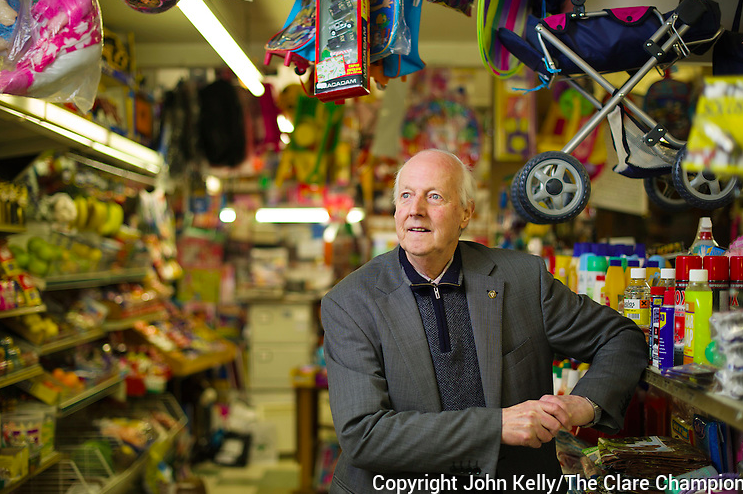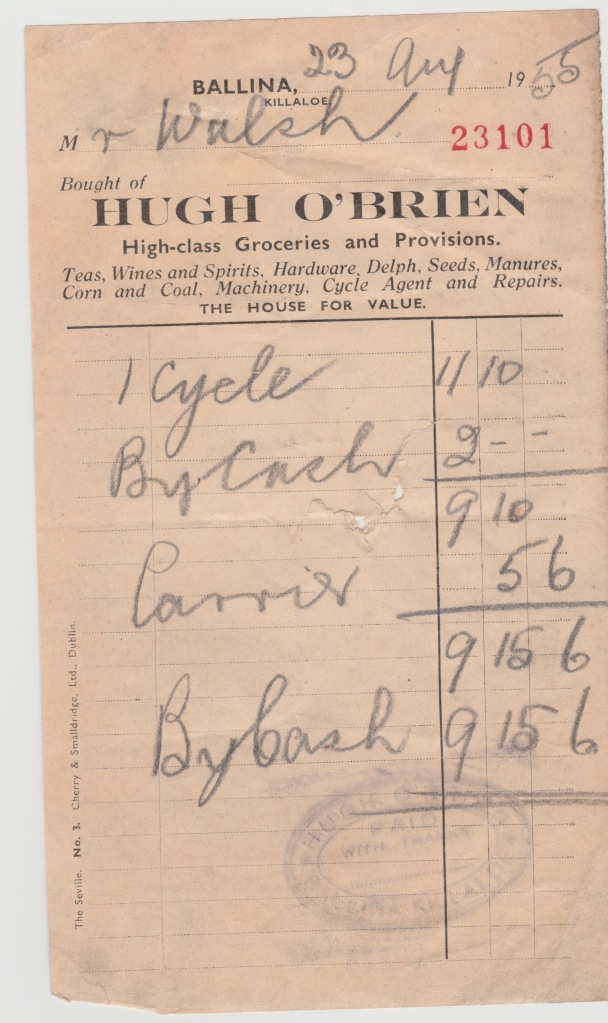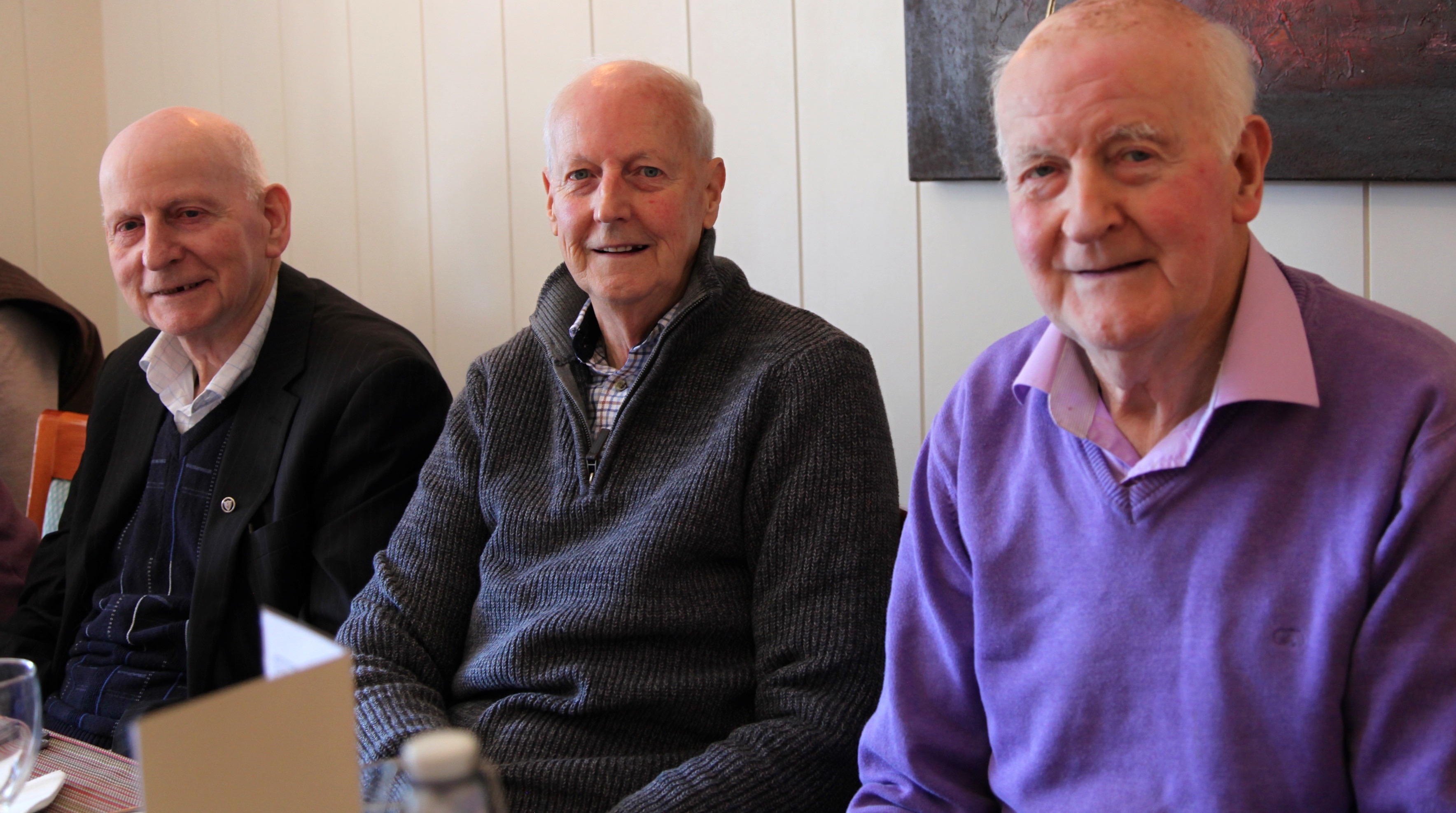The final interview in the follow on from our August event “Sharing Memories” is a man who have been a huge part of our community for 54 years – Jimmy Whelan of Whelan’s Foodstore and Newsagents.
With no experience in retail, he opened a shop in Killaloe with his late wife in 1964 in the building known locally as Crowes (the building beside The Wooden Spoon which is currently undergoing huge renovations). In 1970 the business moved to the current premises at the bottom of the Main Street in Killaloe.
Jimmy and his daughter Eveleen spoke to Arlene White in Jimmy’s home on 24th July 2018 –
Eveleen worked with her father in the shop and took over the management of same when her father retired in recent years.

Arlene: A couple of years ago, you celebrated 50 years in business with Whelan’s which was great! What encouraged you to open a shop in Killaloe?
Jimmy: I had no experience; never stood behind a counter in my life. Gardening was my job out in Tinnerana. I had no experience serving the public. The only experience I had was on the stage because we had a dance band.
But I kind of stood away a good bit from the microphone there. I didn’t do any of the announcing of the band or anything like that.
Arlene: You didn’t want to be in the limelight?
Jimmy: That’s right.
Eveleen: Who was that, who used to do that?
Jimmy: Michael Addley.
Eveleen: Michael Addley, Lord have Mercy on him. He used to act as PA for the band.
Jimmy: He was a great musician as well of course.
Arlene: You used to play the button accordion, is that right?
Jimmy: I did but I graduated to a Piano accordion because a button accordion didn’t look right with a dance band. It was more for a Ceilí band so I eventually changed over. It didn’t take that long really you know. I got used to it.
Arlene: Ye travelled around the country a lot with the Jimmy Whelan Band!
Jimmy: That’s right.
Arlene: Was it for weddings or dances?
Jimmy: Oh no, dances – small dance halls of course I’ll tell you. T’was only four shillings to go into our dances. We’d have 300 – 400 people max.
Arlene: Would ye get paid to do that?
Jimmy: Oh we did. I’d get paid every night and it’d go around to five other people then, whatever the money was. And the money wasn’t very big now I’ll tell you. Of course money went a lot further 40 year ago – the time I’m talking about now would be 1964 – 1965. The mid-60’s and into the 70’s.
Eveleen: How far did ye travel?
Jimmy: Oh God, we’d travel down into South Kerry, up into North Galway and over into the Midlands.
Arlene: Ye would go down and play and come back again that night?
Jimmy: Oh of course, and work aswell the following day.

Arlene: There were six of ye in the band in total?
Jimmy: There was and I had to pay five of them and pay tax and insurance on a car and replace the car every now and then.
Arlene: So you did all the driving?
Jimmy: I did all the driving yea.
Arlene: And who was in the band?
Jimmy: Michael Addley was the front man, he was a saxophone player and vocalist. Dick Fitzgerald was band leader. He was a trumpet player. Michael Addley lived in Killaloe for many, many years but he eventually moved to England. Dick Fitzgerald lived in Newtown. He is dead now though. He was a very good musician, a very good trumpet player.
Eveleen: I’d just like to add that we got Daddy a tape of Johnny Carroll who is a renowned trumpet player and Daddy said he’s nothing to Dick Fitzgerald.
And Naoise Riordan was their singer. Naoise was from Newtown.
Jimmy: And Neilie Barry played guitar.
And Seamus O’Neill from Tuamgraney. And what about Jimmy McKeogh’s brother, from Newtown. I can’t remember his first name now.
Eveleen: And wasn’t there a Vaughan man?
Jimmy: Yes Vaughan from Ogonnelloe.
Eveleen: I am just trying to visualise the picture we have of the band, we’d hate to leave anyone out. Anthony Rodgers was with you at 12 or 13, wasn’t he.
Jimmy: Yes, he was 13. He was with me for years.
Eveleen: That would have been Deuce and Ger Rodgers father.
Jimmy: Yes and his brother was a drummer as well.
Arlene: So you had a couple of people going through over the years.
Jimmy: Oh God I did. At that time there were people going to England and there was other bands and opposition creeping in. So you’d have to replace them then. Some of them might get a job with a band in Nenagh or Limerick you know, anything could happen, or they’d just get tired of it. Or the wives might get tired of the husbands being out all hours of the night.
Arlene: That might have been the reason. I suppose you would be gone most of the night
Jimmy: The dances that time were on 8 – 12pm in the wintertime and 9pm – 1am in the summertime.
Arlene: And you’d have to pack everything up after that and drive home?
Jimmy: Yes we’d have to drive whatever distance it was. And sometimes we might be 60 or 70 miles from home you know, up in Galway or in South Tipp.
There’d be three in the front and three in the back and all the instruments would be in the back then with a rack on top for the drums cause they were fairly bulky.
Arlene: So you were fairly well known around the country then.
Jimmy: Oh God we were. We were out every Sunday night. But the money was still small you know.

Jimmy: I opened the shop in January 1964 and I had the two things going – the shop and the band.
Eveleen: You were in the Fire Brigade as well weren’t you?
Jimmy: I gave up the Fire Brigade then. No point being in the Fire Brigade if you were going off down County Limerick or up to Galway, or North Tipperary.
Eveleen: You rented Crowes building, is that right?
Jimmy: Oh ya, we rented it – Church Street.
Arlene: That was the first shop, was it?
Jimmy: That was the first shop, above where we have the present shop. It was a small shop there with no back door, only up the stairs. We finished leaving that with 4 small children, and no back door.
Arlene: And did ye live upstairs and the shop was downstairs?
Jimmy: We lived upstairs, ya.
Eveleen: How much a week was that? How much was the rent?
Jimmy: It started at £2 a week
Eveleen: £2 a week and he had the shop and the flat for that
Arlene: £2 a week…I suppose it was hard to bring in close to £2 a week then?
Jimmy: Oh it was – £2 went a long way.
Eveleen: Am I correct in saying that there was two bedrooms in the flat upstairs and ye rented one of the rooms to two guards?
Jimmy: That’s right and we had a kitchen then beside the shop on the ground floor. A tiny kitchen you know. And we had a living room upstairs then.
Arlene: And would ye cook for the guards, would your wife cook for them? Was it bed and board?
Eveleen: I think Mrs. Hinchy used to cook for them – didn’t she do the dinners?
Jimmy: No food, just bed. We had an extra room. The children could sleep in our room you know cause they were only small, a year old maybe.
Arlene: And what year did ye finish in Crowes and move down to your existing premises, do you remember?
Eveleen: December ’69 we moved, January 1970 you started.
Jimmy: In what was known as the Kincora Hall, a dance hall
Arlene: That belonged to the Ryan’s, didn’t it?
Jimmy: Yes exactly. Seán Ryan the singer and his father was Jimmy Ryan
Eventually we bought it cause it was no longer a dance hall. The Lakeside Ballroom had built up so the Kincora Dancehall had closed down.
Eveleen: After it was a dancehall a VG store took it over, isn’t that correct?
Jimmy: That’s right but they weren’t able to last. The owner was from up around North Clare someplace.
Eveleen: And what happened there? Wasn’t there a fire?
Jimmy: Oh there was!
Eveleen: And you bought it afterwards as a burnt shell.
Jimmy: Oh yes, a burnt out building.
Arlene: So you had a lot of work to do to it then to get it ready to open?
Jimmy: Oh we did. I had to build a house behind the shop. Luckily enough by the time we bought it, there was a back entrance onto John Street because when the Dance hall was going well, the fire people in Ennis, Clare County Council insisted that there was a back way out of the dance hall in case they couldn’t come out through the front if the fire was out the front so that’s why they had to have a back entrance and a front entrance.
Arlene: And did ye live at the back then for a while?
Jimmy: We lived behind the shop. We had a living room and a kitchen downstairs and a storeroom and the shop to the front and we slept upstairs then.
Arlene: What year did you buy this house then?
Eveleen: We reckon around 1980 or 1981.
Arlene: And what was this house before you bought it?
Jimmy: T’was a doctor’s residence, Dr. Mary Courtney. She resided here for maybe 40 years. She was a native of Killaloe and she opened a practise here when she qualified.
In the house here!
Eveleen: And T.J. O’Brien’s mother was her nurse – Nurse Grace.
Jimmy: She had a living room and kitchen and over there was a waiting room and surgery for seeing her patients.
Arlene: So when the house came up for sale when she was gone, ye decided to buy it.
Eveleen: Her brother was here for a while, Tom Courtney his name was. And when he passed their nephews and nieces sold it.
Arlene: When you first opened the shop say, you obviously didn’t have the selection that you have nowadays.
Jimmy: Oh no, you see the first shop was further up the street, up in Bridge Street and the shop was only less than a third of the size of the shop we have at the moment
Arlene: And what was the main thing that you used to sell, would it be like bread and milk or….
Jimmy: Oh God ya, we’d have general groceries. You would, you’d have to have a little of everything, you know. Of course, we had no fresh meat or anything like that, we had a meat counter so we done cooked meat do you know, rashers and sausages and that type of thing. The same as we have now only on a smaller scale you know.
Eveleen: And I think it’s worth mentioning that Mrs. Ryan or Maggie Ryan as she was known. She had a shop down on the corner. You’d Mrs. Cleary down Bridge Street selling the newspapers.
Jimmy: You’d Margaret Rafferty on Bridge Street above us.
Eveleen: Yes, Mrs. Rafferty was where Mrs. Lyons’s was. And Ryan’s had a shop where Kincora House is that was a shop in Daddy’s time.
Jimmy: Crotty’s was the leading shop.
Arlene: And everyone was able to make a living then?
Jimmy: Surviving….I don’t know if you’d call it making a living (laughing).
But there was no-one going to Limerick that time.

Arlene: So you got everything you needed in Killaloe?
Jimmy: You could.
Eveleen: And people shopped every day, didn’t they.
Jimmy: Oh they did.
Eveleen: They would come down the town every day and get what they needed for that day’s dinner.
Arlene: There was no big shop for the week then?
Jimmy: Well some people would, anyone living out the country, they wouldn’t be coming in every day, you know; people from out around Bridgetown and that way. They would only come in once a week maybe. But there was no money being spent in Limerick I’d say at that time in the early 60’s, it was all being spent in Killaloe and Ballina.
Eveleen: These are things that I’ve learned since Daddy retired, he has more time to talk. Crotty’s used to deliver out to Daddy’s family out in Tinnerana. Daddy used to live out in Tinnerana.

Jimmy: Crotty’s was the leading shop at the time.
Eveleen: It was run by Bridget Floyd. So Daddy’s parents shopped in Crotty’s and it was delivered out to them cause my grandmother wouldn’t be coming into town that often. And you got your meat from Chris Minogue’ father, Willie Minogue.
Arlene: So you has everything you needed on the one street really.
Jimmy: Yes and there was another butcher stall further up the street, two brothers were running it, Moloney’s. There was another butcher stall at the back of McKeogh’s, when McKeoghs took it over they started running it and they are running it still themselves!
Arlene: It was a busy time?
Jimmy: It was busy times but sure you had them all shopping in Killaloe then.
Eveleen: And your half day was on a Wednesday wasn’t it?
Jimmy: Oh half day, closed shop.
Eveleen: Wednesday.
Jimmy: We’d come home then about half six from the wholesaler bringing home the stuff for the shop you know.
Arlene: So it wasn’t a day off at all?
Jimmy: Oh not all all, no time off.
Eveleen: And then the’d open again that evening while they’d be unloading the groceries, they’d open again if someone wanted something
Jimmy: We’d be stocking up the shop from the van, it’d be parked outside and then…
Arlene: People might pop in and buy something then
Jimmy: Oh they would ya
Arlene: And did you open every day?
Jimmy: Oh definitely (laughing)
Arlene: Ya, seven days
Jimmy: Oh seven days
Eveleen: And then, they were the times – did ye close a little earlier on a Sunday or was it a half day on a Sunday?
Jimmy: Oh God no, Sunday was a great day
Eveleen: Sunday was a busy day
Jimmy: The soft ice-cream machine…so you’d be getting Limerick people coming you know.
Maggie Ryan’s was down at the corner and they’d stop there.
Arlene: The bus used to stop there one time didn’t it?
Eveleen: It did. And Maggie Ryan’s husband used to sell petrol, down near where Alchemy is now.
Jimmy: Yes just down from the Allied Irish Bank there.
Arlene: There were petrol pumps there? God imagine putting pumps there now, you wouldn’t be able to stop for two minutes there.
Jimmy: Exactly and the street only 10 or 12 foot wide.
Arlene: So you’d just get Limerick people coming out for the day to spend it by the lake?
Jimmy: Limerick people were always coming to Killaloe, cause I mean Kilkee and Lahinch was a very long drive but you could out to Ogonnelloe or out to Two Mile Gate or out to Castlelough.
Arlene: Ya, so they’d be passing through here.
Jimmy: There was a great variety of places to go and you could swim you see, you know.
Eveleen: And there was the water-skiing in Killaloe at that time.
Jimmy: Oh it was ya
Eveleen: And Hector Newman was…was it Hector Newman owned the hotel at that time?
Jimmy: T’was ya
Eveleen: Hector Newman ya.
Arlene: When the water skiing championships were on? Ya! So t’was a busy place.
Had you…was there one day, any day in particular that was busiest?
Jimmy: Oh ya it’d be Saturday. At that time people didn’t shop on Friday cause they weren’t paid until Friday night, you know, so shopping was done on Saturday. A lot of them would have a book from Monday to Friday and they’d bring down the book with them every morning, they’d have wrote in what they wanted and I’d extend the price and they’d bring down the book then with them on Saturday.
Arlene: And give you the money?
Jimmy: And pay for the week’s messages. And we never got caught with anybody. It was all sound people that we gave the book to.
Arlene: So they wouldn’t think if it!
Would local farmers, say from Ballina, shop with you or would they have their own milk and eggs and things like that.
Jimmy: A lot of people came from Ballina as well and they’d be buying general groceries. Milk was delivered house to house that time.
Eveleen: Pakie McMahon was delivering the milk back then.
Jimmy: Yes with a Pony & Car, he’d do all Ballina and all Killaloe. He’d deliver to everyone’s house.
Arlene: Did you have staff working for you all the time?
Jimmy: Oh I did, ya, I always had a girl. My wife Lord have Mercy on her – t’was child after child, the first child wa sonly 11 months when the second child came along. I think at one stage we had five children under six. She had a girl helping her you know.
Eveleen: The first girl to every work for you was Anne McKeogh, now Anne Harrington. She’d be Margaret McKeogh’s sister. Anne was their right had woman really cause she would work in the shop and she would look after us children.
Jimmy: Her father used to cut out headstones – that was his job. He was the local stone mason.
Arlene: There was a huge amount of business in the town when you think of it going back?
Jimmy: Oh there was back then.
Eveleen: It’s worth mentioning that there was four of the Touhy’s working there at one Bernadette, Mary, Christina and their younger brother Martin all worked at the same time on the shop. There was Mary Gleeson in Grange, Isabelle Lucas, Antoinette Vaughan, Tadhg Moloney was the main man and lots in between. Of course now we have Marie Molloy – Marie Ward, she is with us over 17 years now.
Jimmy: A lot of people I’d say go straight into Limerick now, in for the choice and I don’t blame them for that. We are happy with what we are taking and we’ve managed to live out of it, you know. We managed to buy this house here and so on.
Arlene: And you brought up a good sized family….
Jimmy: Oh a good big family, yea and some of them were very hard on the tyres if you know what that means (laughing)
Eveleen: Ah don’t be talking about Eimear like that Daddy, that’s not fair (laughing)
Jimmy: There was more than Eimear at it.
Arlene: And you branched into towns and things then.
Jimmy: We did, we branched into them very early on.
Eveleen: Just as an example now, how often would you have gone to the toy shop in a year?
Jimmy: About three times a year.
Eveleen: Whereas now, we go almost every two weeks to top up on the toys, that’ll show you how times have changed.
Arlene: I suppose at that time toys were only bought at Christmas
Jimmy: And Birthdays.
Arlene: Would toys be out away for birthdays and Christmas and paid for weekly?
Jimmy: Oh they would. That would start around November time. Toys would be put away upstairs, they’d pay a deposit of course, we wouldn’t put anything away until there was a deposit paid, and they’d continue to pay away every week and then when Christmas would come they’d walk down and collect their toys, and there’d be no big bills then. It was a handy way for them you know.
Eveleen: And you used to do Santa Claus in the shop didn’t you. There is a picture over there of Santa Claus in the shop.
Arlene: I remember that and I’m sure every child in the town and surrounding villages will have a picture of Jimmy’s Santa.
Jimmy: I was never Santa, I had another man who would do it.
Arlene: It was a fantastic service you know, open seven days
Jimmy: Oh yea, open seven days. See Crotty’s at that time would only be doing five and a half days, you know the big shop on the corner as you go up Main Street. There was two girls there running that and neither of them were married and they had a bakery there so they had a lot of things going. They had a bar there as well but they were able to live out of five and a half days in the grocery.
Arlene: You had the monopoly then with seven days opening.
Jimmy: Oh we had yea.
Eveleen: You have had Heaney’s as well at the top of the street, John Heaney. They were started before you.
Jimmy: Oh they were yea.
Eveleen: And Mrs. Reddan’s bar there. They were two more of the older businesses.
Arlene: And Phelan’s.
Eveleen: That’s right.
Jimmy: And Minogue’s had a shop facing the Church, on the actual Green. What’s in that now?
Eveleen: It’s residential now. It’s the house there with all the ivy on it beside where the library was. There was a shop there.
Arlene: Recently a gentlemen brought us a load of receipts from his ancestors home and there was a receipt for a Hugh O’Brien.
Eveleen: He was where the Washerwoman is now.

Jimmy: He was a big merchant. Compared to him we were only in the hal’penny place. He was a big business man. He was from the North. He had no family, it was just himself and the wife. They worked hard as well you know.
Arlene: Looking at the receipts, we could see all these different shops along the Main Street, some of them I have never even heard of.
Eveleen: Jack Byrnes also had a great business. There where Mary Howards was.
Arlene: And was that a Grocery shop?
Jimmy: Oh it was yea.
Arlene: And was there a lot of clothes shops?
Eveleen: Madge Gleeson would have been the main one. And Katheen Nash followed on.
Jimmy: And you had Crowe’s of course.
Arlene: It sounds like it was a hive of activity.
Jimmy: You had a huge flow of people into Killaloe that time that you haven’t got now. It’s a flow out of Killaloe now. They all go to Limerick.



Fabulous read
LikeLike